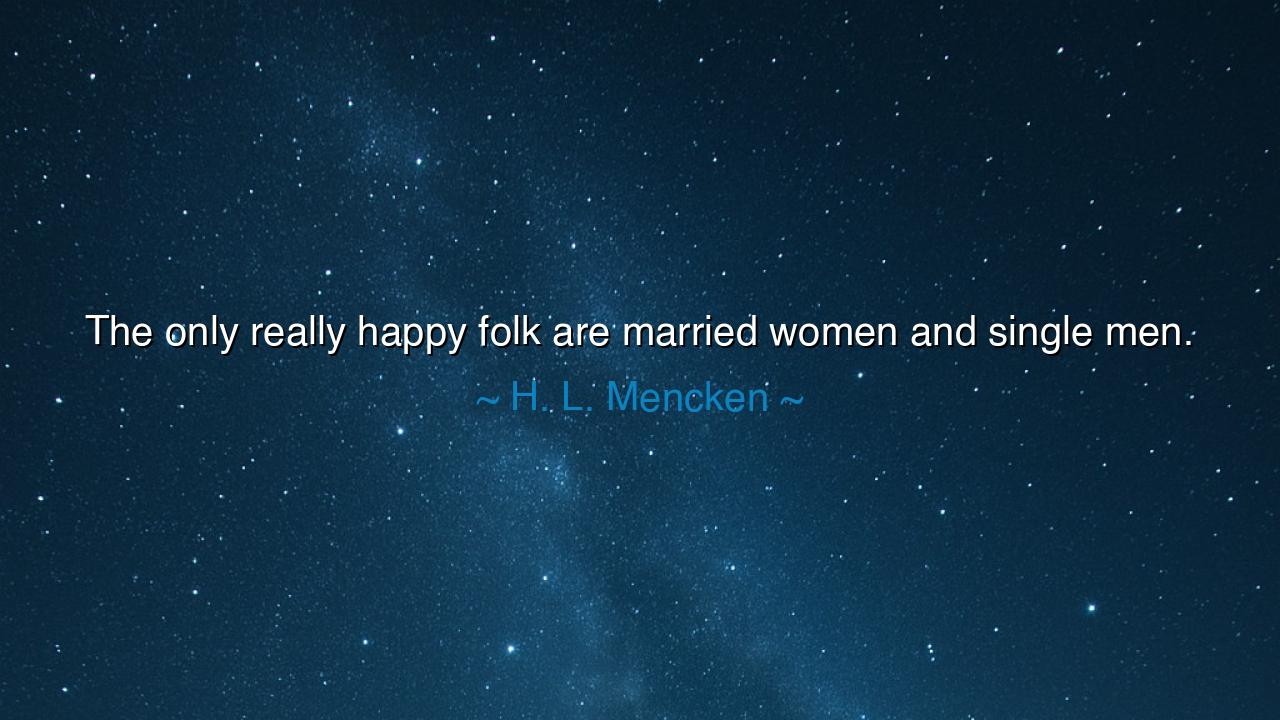
The only really happy folk are married women and single men.






"The only really happy folk are married women and single men." These words, uttered by the sharp-witted H.L. Mencken, echo with a certain irony, a truth wrapped in jest, yet laced with a deeper wisdom about the nature of freedom, responsibility, and the complexities of human relationships. Mencken’s observation may seem to mock, but it carries with it the insight that happiness often lies in the balance between freedom and commitment—a balance that, for some, is found in the peculiar union of marriage or the independent path of singleness.
Consider the ancient philosophers—especially those like Socrates, who pondered the very nature of human joy. Socrates, in his own life, chose neither marriage nor the comforts of the traditional family structure. He sought happiness through intellectual pursuit, an ideal free from the burdens of material concerns and domestic life. In contrast, Plato—though a philosopher in his own right—believed in the stability and fulfillment that could come through the establishment of the family unit. Yet, both men in their search for meaning were examining the same question: what truly brings happiness? Socrates may have found liberation in his lack of family ties, while Plato sought fulfillment in the responsibilities of marriage.
In Mencken’s quote, we see two paths of human experience. The married woman, often burdened with the weight of familial duty, may find in her marriage a paradoxical form of contentment. Marriage, though demanding, can offer its own form of security and joy. The wife, as the cornerstone of the household, becomes the center around which the family revolves. She may toil, but her labor is not without reward, for her work creates a family—a unit that sustains and nurtures, a foundation upon which future generations are built. In this role, there is satisfaction—a fulfillment derived from service, from caring for others, and from the stability that family life offers. Thus, Mencken’s wry observation about the happiness of married women may lie in their sense of purpose—a purpose that transcends the mundane and touches the eternal.
On the other side of the equation stands the single man, who, in his freedom, finds joy in the absence of domestic responsibility. In the ancient world, it was the warrior or the adventurer, free to roam, to conquer, to follow his desires without the tether of family life. The single man stands as a figure of independence and self-determination, his happiness often bound to his ability to create his own path. Consider the Greek hero, Achilles, whose greatness was not tied to a family but to his freedom to seek glory on the battlefield. His joy was found in his autonomy, in the strength of his individual will. The single man, much like Achilles, may find joy in the freedom to define his own life, free from the constraints that marriage and domestic obligations impose.
Yet, we must also understand that Mencken’s words do not simply glorify single life or marriage in isolation. Both states are fraught with challenges—the married woman may face burdens of work and emotional strain, while the single man may suffer from loneliness and a lack of deep connection. True happiness, Mencken hints, lies not in the circumstances themselves, but in the balance that individuals strike between their desires, their responsibilities, and their freedom. The ancient wisdom of balance teaches us that neither absolute freedom nor absolute duty can bring lasting joy. It is in the dance between these two that the soul finds its truest expression.
The lesson Mencken offers is one of perspective—to understand that happiness is relative, shaped by our personal circumstances and the choices we make in life. The married woman finds joy in connection, in the shared experience of life’s journey, while the single man finds happiness in autonomy and self-expression. Both are paths to fulfillment, yet neither is without its own set of challenges. Let us remember that in our own lives, we too must navigate the balance between responsibility and freedom—to find contentment in both relationship and independence.
Thus, as you journey through life, reflect upon Mencken’s words and seek to understand the deeper truth they reveal. Are you seeking freedom through singleness, or purpose through the commitments you make? Both paths can lead to joy, but it is up to you to determine where your own balance lies. In the end, the pursuit of happiness requires not only an understanding of the external world but a deep reflection on the internal landscape—on what truly satisfies your soul. So, embrace the path you choose, knowing that it is through understanding and embracing both the freedom of the single life and the responsibility of commitment that true happiness can be found.






AAdministratorAdministrator
Welcome, honored guests. Please leave a comment, we will respond soon